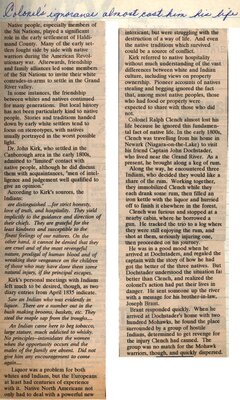"Colonel's Ignorance Almost Cost Him His Life"
- Full Text
- Colonel's ignorance almost cost him his life
Native people, especially members of the Six Nations, played a significant role in the early settlement of Haldimand Country. Many of the early settlers fought side by side with native warriors during the American Revolutionary war. Afterwards, friendship and family alliances led some members of the Six Nations to invite their white comrades-in-arms to settle in the Grand River valley.
In some instances, the friendship between whites and natives continued for many generations. But local history has not been particularly kind of native people. Stories and traditions handed down by early white settlers tend to focus on stereotypes, with natives usually portrayed in the worst possible light.
Dr. John Kirk, who settled in the Canborough area in the early 1800s, admitted to "limited" contact with native people, although he did discuss them with acquaintances, "men of intelligence and judgement well qualified to give an opinion."
According to Kirk's sources, the Indians:
are distinguished... for strict honesty, love of truth, and hospitality. They yield implicitly to the guidance and direction of their chiefs. They are grateful for the least kindness and susceptible to the finest feelings of our natures. On the other hand, it cannot be denied that they are cruel and of the most revengeful nature, prodigal of human blood and of wreaking their vengeance on the children of those who may have done them some natural injury, if the principal escapes.
Kirk's personal meetings with Indians left much to be desired, though, as two diary entries from April 1835 indicate.
Saw an Indian who was evidently in liquor. There are a number out in the bush making brooms, baskets, etc. They steal the maple sap from the toughs...
An Indian came here to beg tobacco, large stature, much addicted to whisky. No principles--intimidates the women when the opportunity occurs and the males of the family are absent. Did not give him any encouragement to come again...
Liquor was a problem for both whites and Indians, but the Europeans at least had centuries of experience with it. Native North Americans not only had to deal with a powerful new intoxicant, but were struggling with the destruction of a way of life. And even the native traditions which survived could be a source of conflict.
Kirk referred to native hospitality without much understanding of the vast differences between white and Indian culture, including views on property ownership. Pioneer accounts of natives stealing and begging ignored the fact that, among most native peoples, those who had food or property were expected to share with those who did not.
Colonel Ralph Clench almost lost his life because he ignored this fundamental fact of native life. In the early 1800s, Clench was travelling from his home in Newark (Niagara-on-the-Lake) to visit his friend Captain John Dochstader, who lived near the Grand River. As a present, he brought along a keg of rum.
Along the way, he encountered three Indians, who decided they would like a share of the rum. Working together, they immobilized Clench while they each drank some rum, then filled an iron kettle with the liquor and hurried off to finish it elsewhere in the forest.
Clench was furious and stopped at a nearby cabin, where he borrowed a gun. He tracked the trio to a log where they were still enjoying the rum, and shot at them, seriously injuring one, then proceeded on his journey.
He was in a good mood when he arrived at Dochstaders, and regaled the captain with the story of how he had got the better of the three natives. But Dochstader understood the situation far better than Clench, and realized the colonel's action had put their lives in danger. He sent someone up the river with a message for his brother-in-law, Joseph Brant.
Brant responded quickly. When he arrived at Dochstader's home with two hundred Mohawks, he found the place surrounded by a group of hostile Indians, determined to get revenge for the injury Clench had caused. The group was no match for the Mohawk warriors, though, and quickly dispersed.
- Media Type
- Newspaper
- Publication
- Item Types
- Articles
- Clippings
- Description
- "Native people, especially members of the Six Nations, played a significant role in the early settlement of Haldimand County. Many of the early settlers fought side by side with native warriors during the American Revolutionary war. Afterwards, friendship and family alliances led some members of the Six Nations to invite their white comrades-in-arms to settle in the Grand River valley."
- Subject(s)
- Personal Name(s)
- Kirk, John ; Clench, Ralph ; Dochstader, John ; Brant, Joseph.
- Local identifier
- SNPL003280v00d
- Language of Item
- English
- Geographic Coverage
-
-
Ontario, Canada
Latitude: 43.06681 Longitude: -80.11635
-
- Creative Commons licence
 [more details]
[more details]- Copyright Statement
- Public domain: Copyright has expired according to Canadian law. No restrictions on use.
- Contact
- Six Nations Public LibraryEmail:info@snpl.ca
Website:
Agency street/mail address:1679 Chiefswood Rd
PO Box 149
Ohsweken, ON N0A 1M0
519-445-2954




